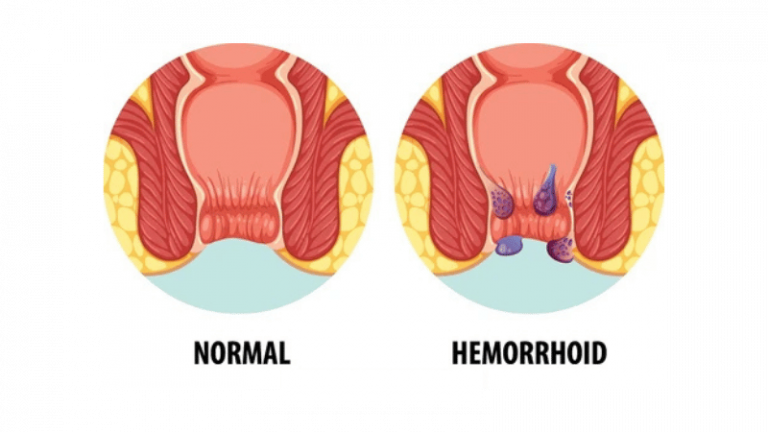Hemorrhoids are cushions of veins and other tissue around the anus and lower part of the rectum. These pills swell temporarily during a bowel movement, but when the swelling is persistent, it’s considered hemorrhoid disease.
Hemorrhoids can become swollen and inflamed from factors such as constipation and straining during bowel movements. Hemorrhoid swelling isn’t something to overlook, as it can impact your quality of life. It can also worsen, leading to greater discomfort and increasing the risk of complications such as a prolapsed hemorrhoid. Understanding what causes hemorrhoid swelling and how to address this symptom can help you get lasting relief.

Hemorrhoids naturally swell and become larger during a bowel movement to help stool move easily through the anal canal. However, too much pressure causes the veins to stretch, stay enlarged, and become inflamed. Common causes of swollen veins include constipation, straining while having a bowel movement, sitting for long periods, and pregnancy.
Hemorrhoid swelling can vary depending on whether the swollen anal veins are external or internal.
External hemorrhoids develop outside of the anus, where there are more pain-sensing nerves. They are covered by anal skin that’s stretched to make room for the enlarged veins. When they swell, they form a hard lump near the anus and can feel tender to the touch.
Other signs of a swollen external hemorrhoid include:
Internal hemorrhoids develop in the upper part of the anal canal or lower rectum, so the swelling isn’t visible unless they drop outside the anus and become prolapsed.
A prolapsed hemorrhoid will feel like a soft lump or bulge hanging out of the anus. The swelling associated with prolapsed hemorrhoids is caused by increased pressure in the anal veins. This can occur due to stress during bowel movements, prolonged sitting, or other factors restricting proper blood flow. As the veins become engorged, they may protrude and cause discomfort.
Some internal hemorrhoids are asymptomatic, which means you can have swollen anal veins without realizing it. Others can cause symptoms, such as:
The more swollen and enlarged hemorrhoids are, the more pressure and discomfort a person might feel during a bowel movement.
Swollen hemorrhoids can affect everyday life. Normal activities like sitting, walking, and bowel movements can be severely uncomfortable or painful. This can cause distress and embarrassment, affecting your emotional well-being.
If there’s continued pressure from straining or other factors, an untreated internal hemorrhoid can become more inflamed and prolapse. Prolapsed hemorrhoids can be very painful, and if they reach the point where they can’t be pushed back inside the rectum, they can cause ongoing pain and discomfort.
There are several ways to reduce hemorrhoid swelling and get relief.
Over-the-counter treatments can help manage symptoms temporarily. These include:
Anti-inflammatory creams or ointments: These can reduce swelling, itching, and inflammation, providing short-term relief.
Suppositories like Preparation H: These contain ingredients that help shrink swollen anal veins and alleviate discomfort.
While these treatments may offer temporary relief, they are a good option for managing symptoms until you can seek medical advice.
In some cases, medical treatment is necessary to alleviate swelling from internal hemorrhoids in the long term. External hemorrhoids, on the other hand, are likely to go away on their own.
Non-surgical treatments: Hemorrhoid Artery Embolization (HAE) is a minimally invasive procedure offered at USA Hemorrhoid Centers. HAE works by shrinking hemorrhoid tissue and can be performed in an outpatient setting with a brief recovery time. It is an effective option for many cases of hemorrhoids that require treatment.
While there are over-the-counter options available, the best course of action is to consult a specialist for a proper diagnosis to see if Hemorrhoid Artery Embolization (HAE) is right for you.
A prolapsed hemorrhoid that doesn’t retract on its own and swollen hemorrhoids that also bleed or are painful should be seen by a hemorrhoid doctor. They can give you a diagnosis and recommend a personalized treatment plan.
Generally, if you notice your hemorrhoid symptoms don’t start improving after a few days, they might not resolve without medical treatment. The earlier you can see a hemorrhoid doctor and get treatment, the better, as early treatment can lead to better outcomes and help you avoid more severe symptoms.
At USA Hemorrhoid Centers, our hemorrhoid doctors treat internal hemorrhoids with hemorrhoid artery embolization (HAE). They also provide personalized treatment to help our patients feel better and get back to enjoying life without worrying about hemorrhoid symptoms. Schedule a consultation at a hemorrhoid clinic near you and determine if HAE is right for you.
Over-the-counter hemorrhoid creams, ointments, or suppositories can help mitigate swelling at home. Sitz baths, which are warm, shallow baths, can also temporarily relieve swelling and pain from hemorrhoids until proper treatment.
Hemorrhoid swelling can last for a few days. However, if it persists for more than a week, the hemorrhoid can become more inflamed, and you may start noticing other symptoms, such as bleeding and pain. Left untreated, hemorrhoids can last for months or longer, and they can become more severe.
Hemorrhoid swelling can go away on its own after a few days. You can add fiber to your diet to reduce constipation and minimize excessive straining during a bowel movement. Avoiding sitting for long periods can also help encourage swelling to lessen.
I am so glad to have gone to USA Hemorrhoid Centers. My experience has been amazing. The staff are all so friendly but professional. The doctor is wonderful and in his professional manner makes you very comfortable and explains anything you have questions about. So very happy.

USA Hemorrhoid Centers all staff were incredible. They communicated throughout and checked in frequently to ensure I was as comfortable as possible. I am happy I chose to get the treatments and look forward to the improvements.

I am so glad to have gone to USA Hemorrhoid Centers. My experience has been amazing. The staff are all so friendly but professional. The doctor is wonderful and in his professional manner makes you very comfortable and explains anything you have questions about. So very happy.

USA Hemorrhoid Centers all staff were incredible. They communicated throughout and checked in frequently to ensure I was as comfortable as possible. I am happy I chose to get the treatments and look forward to the improvements.

Skip the wait times! Scheduling at your fingertips, 24/7. Our doctors who perform Hemorrhoid artery embolization are experienced interventional radiologists with expertise in vascular anatomy.
USA Hemorrhoid Centers

Quick Links